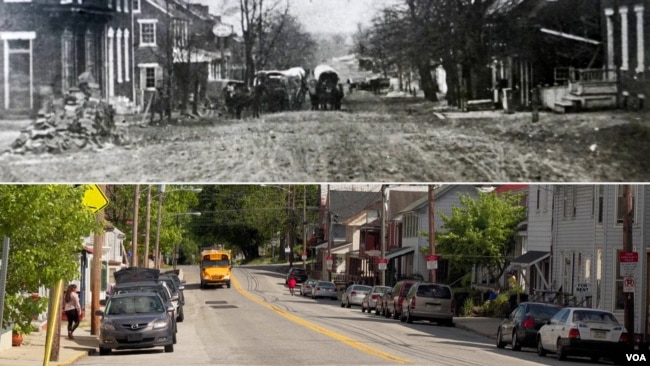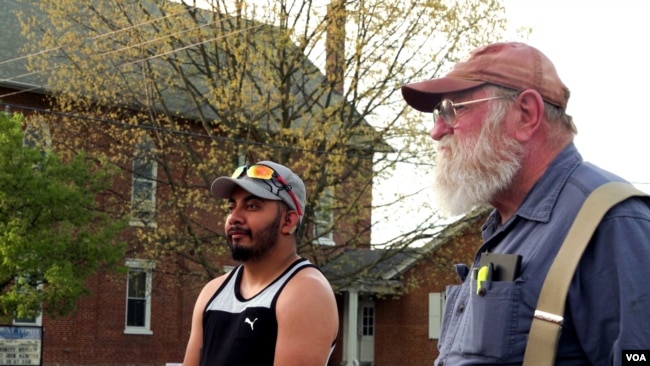YORK SPRINGS, PENNSYLVANIA —
"They took my brother."
The visibly frightened woman speaks from inside the doorway of a multi-family house as she describes how U.S. Immigration and Customs Enforcement agents came at night, knocking on apartment doors, demanding to be let in.
"He's now at a detention center in York (nearby city)," she says in Spanish, giving her name only as Maria. After living in tiny York Springs, PA, for the past three years, the 38-year old woman is planning to return to Mexico with her three children.
She’s not alone. Lately, the streets of the York Springs have been emptier and “for rent” signs have popped up in front of some buildings. A new layer of fear hangs over the rural Pennsylvania town and its large Hispanic population in the wake of recent sweeps by ICE agents.
York Springs has developed differently from most other rural Pennsylvania towns. Located in farm country near the site of one of the most decisive battles in the American Civil War, York Springs began as a spa, attracting patrons from Washington and Philadelphia who came for the sulphur springs. Among them, records show, was America's first president, George Washington.
In the mid-20th century, the population of York Springs began to change as successive waves of migrant workers came to pick fruits and vegetables in the orchards and farms surrounding the town. The demand for migrant workers grew as farmers could no longer count on hiring enough locals at harvest time, according to Cathay Snyder, president of Ye Olde Sulphur Spa Historical Society. Snyder says the first wave of migrants was African American. They came in the 1960s, but did not settle in the town. Two decades later, they were followed by Hispanics, mainly from Mexico. They, too, left after the harvest.
That began to change, Snyder says, when migrants found year-around work in the orchards.
"More and more stay and make this their home," Snyder told VOA. "The husbands, the fathers, might be working out in the orchards, which were starting now to need more pruning and other year-around work, but you're also having wives finding jobs in some of the factories that are in the area."
Now, York Springs, with a population of 800, is almost half Hispanic. The town is something of an anomaly in Adams County which is 95% white. The county voted overwhelmingly for President Donald Trump and his tough immigration policies in last fall’s election, 66% to Hillary Clinton’s 30%.
Mexican music
The impact of the new residents on the town has been pronounced. Children born to immigrant families began attending the local school, and a Mexican store opened up on a corner building on Main Street that was once a Five & Dime.
"There were more people out on the streets, more kids," said Ben Leese, pastor of the Holy Trinity Lutheran Church who has lived in York Springs for 10 years. "You'd hear Mexican music from a lot of the houses, from a lot of the cars."
When the immigrants first came, Snyder says, there was what she called some "misunderstanding" between the native-born whites and the Hispanics. But that has changed.
"I would say that we see more of a type of accommodation," Snyder said. "I wouldn't say that we have a blended family, but I think there's respect on either side."
New population shift?
An ICE statement provided to VOA says 15 people were arrested in York Springs from January through March of this year. The arrests have sent a wave of fear through the community.
"They're scared," said pastor Leese. "And the really scary thing to me and lots of folks here is kids go to school and come home and Mom or Dad, or both, may have been picked up."
Teachers at the nearby Bermudian Springs school have sensed the fear among their Hispanic students. The school, with its elementary, middle school and high school all in one complex, has a 15 percent Hispanic student body. Bermudian school administrators and teachers are proud of this diversity, and say they have worked successfully to integrate their minority students.
Yet elementary schoolteacher Brooke Shambach, who was born in York Springs, worries that the fear and uncertainty created by the ICE arrests are affecting students.
"Even the young kindergartners are coming in and they’re sad because they hear these things are taking place," Shambach tells VOA. "It’s heartbreaking that that’s what a kindergartner is thinking about, you know. And it's not just in the elementary school, it's in all the buildings.”
While ICE has said that convicted criminals remain the target of arrests, the agency acknowledges it will no longer exempt "...individuals from removal proceedings if they are found to be in the country illegally." This change from the final years of the Obama administration indicates that almost anyone without documents could be subject to deportation.
Even some who voted for President Donald Trump and his stepped-up enforcement of immigration laws think the change is too harsh.
David Reinecker, a 62-year-old farmer who lives on the town's outskirts, supports deporting immigrants who have committed crimes. "But if they're law abiding and are willing to become citizens and get the documentation even after they're here, I think they should be incorporated into our society," he said.
"The Hispanics coming into our country have filled a real need," he added, noting that the U.S. has always been a melting pot of societies and cultures.
The visibly frightened woman speaks from inside the doorway of a multi-family house as she describes how U.S. Immigration and Customs Enforcement agents came at night, knocking on apartment doors, demanding to be let in.
"He's now at a detention center in York (nearby city)," she says in Spanish, giving her name only as Maria. After living in tiny York Springs, PA, for the past three years, the 38-year old woman is planning to return to Mexico with her three children.
She’s not alone. Lately, the streets of the York Springs have been emptier and “for rent” signs have popped up in front of some buildings. A new layer of fear hangs over the rural Pennsylvania town and its large Hispanic population in the wake of recent sweeps by ICE agents.
York Springs has developed differently from most other rural Pennsylvania towns. Located in farm country near the site of one of the most decisive battles in the American Civil War, York Springs began as a spa, attracting patrons from Washington and Philadelphia who came for the sulphur springs. Among them, records show, was America's first president, George Washington.
In the mid-20th century, the population of York Springs began to change as successive waves of migrant workers came to pick fruits and vegetables in the orchards and farms surrounding the town. The demand for migrant workers grew as farmers could no longer count on hiring enough locals at harvest time, according to Cathay Snyder, president of Ye Olde Sulphur Spa Historical Society. Snyder says the first wave of migrants was African American. They came in the 1960s, but did not settle in the town. Two decades later, they were followed by Hispanics, mainly from Mexico. They, too, left after the harvest.
That began to change, Snyder says, when migrants found year-around work in the orchards.
"More and more stay and make this their home," Snyder told VOA. "The husbands, the fathers, might be working out in the orchards, which were starting now to need more pruning and other year-around work, but you're also having wives finding jobs in some of the factories that are in the area."
Now, York Springs, with a population of 800, is almost half Hispanic. The town is something of an anomaly in Adams County which is 95% white. The county voted overwhelmingly for President Donald Trump and his tough immigration policies in last fall’s election, 66% to Hillary Clinton’s 30%.
Mexican music
The impact of the new residents on the town has been pronounced. Children born to immigrant families began attending the local school, and a Mexican store opened up on a corner building on Main Street that was once a Five & Dime.
"There were more people out on the streets, more kids," said Ben Leese, pastor of the Holy Trinity Lutheran Church who has lived in York Springs for 10 years. "You'd hear Mexican music from a lot of the houses, from a lot of the cars."
When the immigrants first came, Snyder says, there was what she called some "misunderstanding" between the native-born whites and the Hispanics. But that has changed.
"I would say that we see more of a type of accommodation," Snyder said. "I wouldn't say that we have a blended family, but I think there's respect on either side."
New population shift?
An ICE statement provided to VOA says 15 people were arrested in York Springs from January through March of this year. The arrests have sent a wave of fear through the community.
"They're scared," said pastor Leese. "And the really scary thing to me and lots of folks here is kids go to school and come home and Mom or Dad, or both, may have been picked up."
Teachers at the nearby Bermudian Springs school have sensed the fear among their Hispanic students. The school, with its elementary, middle school and high school all in one complex, has a 15 percent Hispanic student body. Bermudian school administrators and teachers are proud of this diversity, and say they have worked successfully to integrate their minority students.
Yet elementary schoolteacher Brooke Shambach, who was born in York Springs, worries that the fear and uncertainty created by the ICE arrests are affecting students.
"Even the young kindergartners are coming in and they’re sad because they hear these things are taking place," Shambach tells VOA. "It’s heartbreaking that that’s what a kindergartner is thinking about, you know. And it's not just in the elementary school, it's in all the buildings.”
While ICE has said that convicted criminals remain the target of arrests, the agency acknowledges it will no longer exempt "...individuals from removal proceedings if they are found to be in the country illegally." This change from the final years of the Obama administration indicates that almost anyone without documents could be subject to deportation.
Even some who voted for President Donald Trump and his stepped-up enforcement of immigration laws think the change is too harsh.
David Reinecker, a 62-year-old farmer who lives on the town's outskirts, supports deporting immigrants who have committed crimes. "But if they're law abiding and are willing to become citizens and get the documentation even after they're here, I think they should be incorporated into our society," he said.
"The Hispanics coming into our country have filled a real need," he added, noting that the U.S. has always been a melting pot of societies and cultures.
























0 comments:
Post a Comment